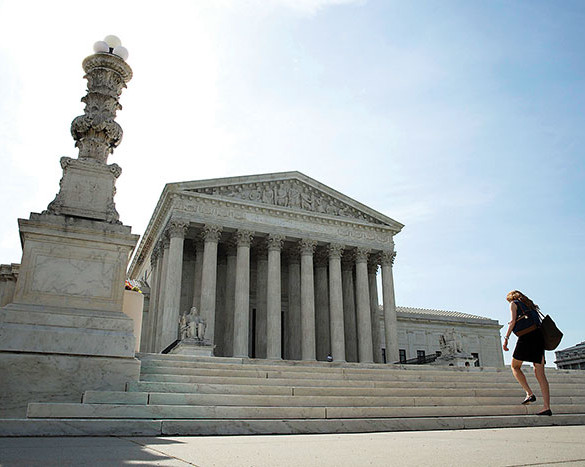WASHINGTON (CNS) – The Supreme Court Jan. 16 agreed to hear four cases over the constitutionality of same-sex marriage, tackling the questions of whether the 14th Amendment requires states to allow such marriages and whether it requires them to recognize same-sex marriages licensed in other states.

A woman walks to the U.S. Supreme Court in Washington late last year. On Oct. 6, 2014 the court declined to hear appeals on rulings striking down same-sex marriage bans. This cleared the path for same-sex marriages to be legally recognized in more states, but also caused some confusion and disappointment for those on both sides of the issue. (CNS phopto/Joshua Roberts, Reuters)
In brief orders, the court accepted petitions from Tennessee, Michigan, Kentucky and Ohio, consolidating them into one hearing that will be held probably in late April, meaning a decision would likely come before the end of the term in late June. The court allotted an unusually lengthy period of time for oral arguments, two and a half hours, compared to a typical 60-minute period.
As of Jan. 16, 36 states and the District of Columbia allow same-sex marriages, either under court rulings or state laws. In the other 14 states, they are prohibited, but those bans are all under legal challenge.
The Catholic Church upholds marriage as a union between one man and one woman and teaches that any sexual activity outside of marriage is sinful. The church also teaches that homosexual attraction itself is not sinful and that homosexual people “must be accepted with respect, compassion and sensitivity.”
The chairman of the U.S. bishops’ Subcommittee for the Promotion and Defense of Marriage said that a decision by the Supreme Court on whether a state may define marriage as the union of one man and one woman “may be the most significant court decision since the court’s tragic 1973 Roe v. Wade decision making abortion a constitutional right.”
“It’s hard to imagine how the essential meaning of marriage as between the two sexes, understood in our nation for over 200 years, and consistent with every society throughout all of human history, could be declared illegal,” Archbishop Salvatore J. Cordileone of San Francisco said in a Jan. 16 statement.
Upholding traditional marriage “is not a judgment on anyone,” he said. “It is a matter of justice and truth. The central issue at stake is: what is marriage? The answer is: a bond which unites a man and a woman to each other and to any children who come from their union.”
After the court announced it would take the marriage cases, U.S. Attorney General Eric Holder said the Obama administration would file an amicus, or friend of the court, brief calling for a decision by the justices that would “make marriage equality a reality for all Americans.”
James Esseks, director of the Lesbian Gay Bisexual Transgender & HIV Project of the American Civil Liberties Union, said in a statement the ACLU was “thrilled the court will finally decide this issue. … The country is ready for a national solution that treats lesbian and gay couples fairly.” The ACLU is a co-counsel in the Kentucky case.
In 2013 the Supreme Court — in separate 5-4 rulings — struck down parts of the federal Defense of Marriage Act, or DOMA, defining marriage as between one man and one woman, and also refused to rule on the merits of a challenge to California’s Proposition 8, the voter-approved initiative barring same-sex marriage.
In the June 26 ruling on DOMA, the court said the federal government could not deny benefits to same-sex couples that were legally married in states that allow such unions based on the Equal Protection Clause. The justices the same day sent back to lower courts a challenge to Prop 8, saying the individuals who defended the law in court lacked the legal standing to do so. On June 28, 2013, a stay on allowing same-sex marriage in California was lifted and such marriages were able to resume.
During his trip to the Philippines, Pope Francis made one of his strongest calls as pope against movements to recognize same-sex unions as marriage.
“The family is also threatened by growing efforts on the part of some to redefine the very institution of marriage,” the pope said Jan. 16, hours after warning that Philippine society was “tempted by confusing presentations of sexuality, marriage and the family.”
